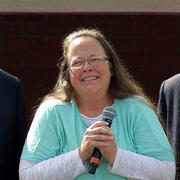
Kim Davis, clerk of Kentucky's Rowan County, has inspired passionate responses from all quarters recently when she refused to grant marriage licenses to same-sex couples.
Many in her community see Davis as a civil rights crusader, standing up for religious freedom. Others see her as a bigot, passing off prejudice as righteousness. Conservative presidential candidates sought to boost their campaigns by standing beside her—and in front of the cameras. Progressives vilified her.
To try and sort through the sensationalism and invective, a group of students, scholars, and others gathered at Harvard Divinity School's Center for the Study of World Religions (CSWR) on Tuesday for "The Curious Case of Kim Davis," a discussion of public service and private belief. The event was the first of the new academic year in CSWR's "Religion in the News" series, which features lunchtime conversations on contemporary issues and are held every few weeks during the semester.
Parkman Professor of Divinity Frank Clooney, the CSWR's director, got things started by discussing Davis's decision not to grant marriage licenses. Clooney contrasted her case with others, including that of a Muslim flight attendant recently fired from her job because she refused to serve alcohol to passengers, and of the Catholic activist Dorothy Day.
"Day believed it was her duty not to pay taxes that would go to the military and nuclear weapons," Clooney said. "But she also accepted that she had to pay the penalty and go to jail."
Davis's willingness—or lack thereof—to accept the consequences of her convictions was a dividing line for many in the group who saw her actions as a manifestation of prejudice rather than principle. MTS student Lou F.S. said that she was confused by the recent "workaround" that enabled the Rowan County office to issue marriage licenses without Davis's approval.
"I saw two options," F.S. said. "Fulfill your job or take the consequences. There seems now to be some middle ground. That's making me feel less clear about what sort of moral stance is happening."
Clooney cited an opinion piece from New Yorker writer and CNN legal correspondent Jeffrey Toobin, who warned that religious conservatives like Davis were advocating for "cafeteria government," in which public officials could "pick and choose which legal obligations to honor." Diane Moore, director of HDS's Religious Literacy Project, expressed concern about the trend.
"It's critical to honor religious liberty," Moore said, "but also the laws of the land. It's appropriate for Davis to decide personally that she can't support gay marriage, but the notion that I get to decide what I will do and won't do under the law challenges the separation of church and state, which is how a secular, multireligious democracy functions."
MDiv student Hal Edmonson pushed back. For all the talk of respecting Davis's religious convictions, he wondered how much of the outrage at her defiance had simply to do with whether or not one agreed with her view of homosexuality. He said that the reactions of many who condemn Davis were different in 2004 when another public official defied the law in order to support same-sex marriage.
"The Davis incident made me think about the time that Gavin Newsom, the mayor of San Francisco, announced that, despite state law, the city would issue marriage licenses to same sex couples," Edmonson said. "Why did that square with me morally? If our rights can't be dependent on which jurisdiction in which you live, it seems that there's a double standard."
Dong Zhao, a professor at Beijing Foreign Studies University and visiting scholar at CSWR this year, expressed surprise and curiosity at the standoff over Davis and the question of individual religious freedom. In China, he said, it's understood that collective rights—represented by the government—trump all other rights.
"For western culture, there has to be a right and wrong, black and white," he said. "But in China, we can find a middle way … a third way that transcends the two extremes. Maybe we can borrow something from eastern philosophy to transcend the harsh perspectives and find compromises … a proper solution that will satisfy all parties."
Faculty and students stayed long after the event ended to continue the conversation over the refreshments that the Center provided for attendees. MTS student James Hackett said that he came to the discussion with his own opinion of Davis and her actions, but was swayed by the comments of his classmates.
"When I sat down, I didn't agree with Davis's views," he said, "but I did admire her conviction and thought that civil law needed to be able to wire around situations like this. After listening to the conversation here, I changed my mind. She has the right to her beliefs, but needed to resign her post so as not to deny others their rights under the law."
—by Paul Massari
